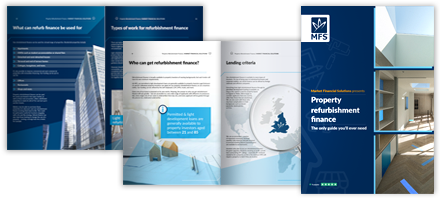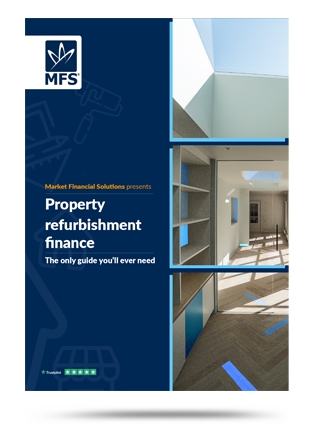
Written by Liza Campion
Head of National Accounts
Market Financial Solutions are a bridging loan and buy-to-let mortgage provider and are not legal, financial, investment or tax advisers. This document is for informational purposes only and does not, and should not be considered, to constitute legal, financial, investment or tax advice or be relied upon by any person to make a legal, financial, investment or tax decision. Therefore, Investors are encouraged to seek appropriate professional advice. The information in this content is correct at time of writing.

Loft conversions are popular upgrade projects, which are relatively easy to understand and execute. But many investors will more likely concern themselves with how to finance a loft conversion.
Fortunately, borrowers have many financial options available to them. There are there the basic options – such as saving income for a project, using a credit card, or seeking out some kind of unsecured loan.
Then there are the more complex routes. So long as it suits their circumstances, people may be able to utilise remortgaging, equity release, or secured loans such as bridging finance for their loft conversions. Some lenders may even have loft conversion loans[1] – products solely designed to be used for a loft conversion.
The route an investor/homeowner takes will be dependent on their specific situation. The most important element to consider however is that whatever option they go for, they need to make sure it covers the costs involved adequately.
How to Finance a Loft Conversion – The Costs Involved
As with any investment or expenditure, the costs involved will vary from person to person. The answer to the question of how to finance a lost conversion is: it depends.
The final bill will depend on the scale of the conversion, the type of work being done, the household’s circumstances and more. But, it is possible to get a rough idea of how much will be needed in funding.
For instance, many loft conversions will likely require insulation upgrades to get the ball rolling. According to the energy saving trust[2], Installing a totally uninsulated loft (0mm) with 270mm of loft insulation would cost around £1,200 for a detached house. Doing the same for a detached bungalow would also cost £1,200, meanwhile it would be £950 for a semi-detached house, or £900 for a mid-terrace house.
All told, the average cost of a 30m2 loft conversion in the UK can range between £27,500 and over £75,000, according to Check a Trade[3]. The variation is the result of the type of conversion being done:
- A velux conversion may cost on average: £27,500
- Dormer: £50,000
- Hip-to-gable: £60,000
- Bungalow (50m2): £75,000
- Modular: £45,000
- Mansard: £65,000
- Shell: £30,000
Fortunately, these costs shouldn’t be raised further by planning permission complications. A loft conversion generally falls within permitted development parameters, meaning it won’t require planning permission. But, it’s still worth checking to make sure that is the case.
There are restrictions/exceptions in place[4], including:
- No extension is to be higher than the highest part of the roof
- Extending or altering a roof space beyond its current limits
If these limits or conditions are not met, a planning permission application will be needed. Homeowners need to be vigilant here, considering fines could be as high as £50,000[5] where the rules aren’t followed.

Why Convert a Loft at All?
While the costs may be high, there are many benefits in converting a loft. Specifically, this may include:
- A relatively short construction period: 6 – 10 weeks to convert [6](on average), whereas a full on development may take several months
- Adding additional living space
- Being a viable alternative to a house extension
- Being able to turn a loft into any space, eg. bedroom, storage or home office
- Utilising unused space
- Creating a room with a view
- Creating the opportunity to improve the energy efficiency of the space
- Removing the need to move house
- Embracing creativity
Arguably though, the key reason to consider a loft conversion is the potential for adding value. A loft conversion may add up to 15% to a home’s value, according to Zoopla[7]. The average house price in England is £302,000[8], meaning a solid loft conversion could add over £45,000 to a home’s price.
How to Finance a Loft Conversion With Bespoke Funding
At Market Financial Solutions, we have bespoke finance available that can be put towards a range of loft conversion strategies. What’s more, our permitted and light development bridging loans can be used for various renovation, refurbishment, and conversion strategies.
This capital can be delivered quickly, in as little as 3 days where everything is accounted for. Our loans are also very flexible in the face of unexpected challenges or delays. Perhaps a house renovation or conversion project is delayed by plumbing problems, or maybe the contractors an investor was using went out of business, leaving borrowers with a looming deadline and limited options.
We can deal with these kinds of issues, and find a way forward. While our borrowers will need to concern themselves with why they are moving forward with their plans, we will be able to help with the question of how to finance a loft conversion.
The Complete Guide to
Refurbishment Finance
Everything you need to know
- Basics of refurbishment
- Different finance types
- Lending criteria & calculator
- Real life case studies
[1] https://www.hsbc.co.uk/loans/getting-a-loft-conversion/
[2] https://energysavingtrust.org.uk/advice/roof-and-loft-insulation/
[3] https://www.checkatrade.com/blog/cost-guides/loft-conversion-cost/
[4] https://www.planningportal.co.uk/permission/common-projects/loft-conversion/planning-permission
[5] https://www.birminghammail.co.uk/news/cost-of-living/uk-households-loft-conversion-risk-29214567
[6] https://www.myhomeextension.co.uk/how-long-does-loft-conversion-take#:~:text=%E2%80%9CTo%20do%20a%20full%20loft,between%20six%20and%20ten%20weeks.%E2%80%9D
[7] https://www.dailymail.co.uk/news/article-13521147/Experts-reveal-three-renovations-make-increase-value-home.html
[8] https://www.ons.gov.uk/economy/inflationandpriceindices/bulletins/privaterentandhousepricesuk/july2024





